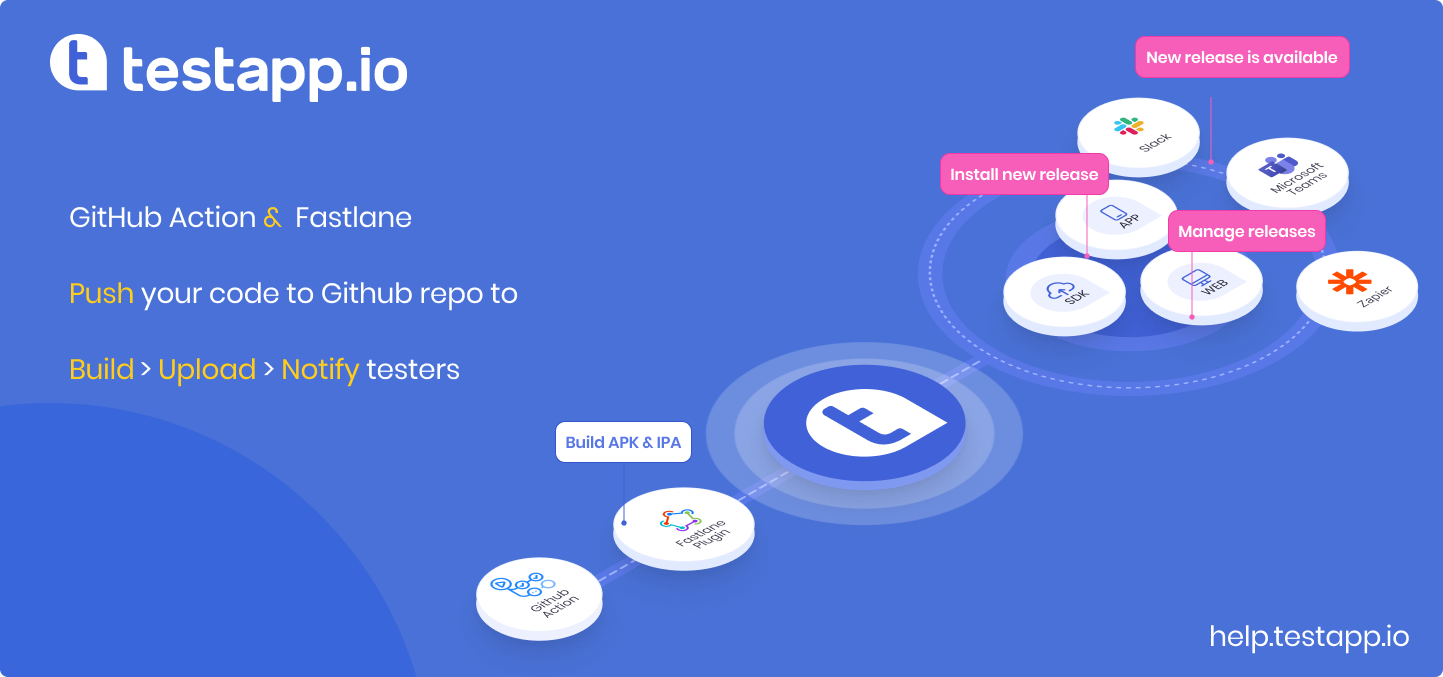GitHub Action with TestApp.io Fastlane plugin allows you to build and upload both Android & iOS apps to TestApp.io to notify your testers for testing and feedback.
Configuration
| Key | Description | Env Var | Default |
|---|---|---|---|
api_token |
You can get it from portal.testapp.io/settings/api-credentials | TESTAPPIO_API_TOKEN |
|
app_id |
You can get it from your app page at portal.testapp.io/apps | TESTAPPIO_APP_ID |
|
release |
It can be either both, android, or ios |
TESTAPPIO_RELEASE |
|
apk |
Path to the Android APK file | TESTAPPIO_ANDROID_PATH |
|
ipa |
Path to the iOS IPA file | TESTAPPIO_IOS_PATH |
|
release_notes |
Manually add the release notes to be displayed for the testers | TESTAPPIO_RELEASE_NOTES |
|
git_release_notes |
Collect release notes from the latest git commit message to be displayed for the testers: true or false |
TESTAPPIO_GIT_RELEASE_NOTES |
true |
git_commit_id |
Include the last commit ID in the release notes (works with both release notes options): true or false |
TESTAPPIO_GIT_COMMIT_ID |
false |
notify |
Send notifications to your team members about this release: true or false |
TESTAPPIO_NOTIFY |
false |
Check TA-CLI for more info
iOS
We will demonstrate with our sample iOS project, testappio-ios-sample-app, to show how GitHub Action + Fastlane + TestApp.io plugin works.
Configure iOS project for Fastlane
1. Install Fastlane
The below command works for most cases. If not, please read this — Setup Fastlane
gem install fastlane
2. Init Fastlane
In the iOS project folder:
bundle exec fastlane init
Follow the wizard — it will create ./fastlane/Appfile with your Apple ID and team.
3. Init Match
Fastlane match is a tool for generating all necessary certificates, provisioning profiles and storing them in a Git repository encrypted.
Create a private empty GitHub repository for storing certificates and provisioning profiles.
bundle exec fastlane match init
Follow the instructions, provide the new empty git repository when asked, and it will create the Matchfile.
This Git repository will be used to store your certificates and profiles.
4. Generate the certificate and provisioning profile
bundle exec fastlane match adhoc
Following the instructions, it will generate certificates/profiles and store them in the Git repository specified in the previous step.
Provide a matching password for encrypting the certificates and profiles in the Git repository.
5. Select provisioning profiles in Xcode
The newly created certificates and profiles should now be possible to select inside your project. Open Xcode and go to Signing & Capabilities.
Don't choose Automatically Manage Signing
6. Add the testappio plugin for Fastlane
bundle exec fastlane add_plugin testappio
7. Configure GitHub Secrets
Create the following repository-level secrets in your GitHub repository (Settings → Secrets and variables → Actions):
MATCH_PASSWORD— the password you specified while generating the certificates and profilesFASTLANE_PASSWORD— the password of your Apple IDMATCH_GIT_BASIC_AUTHORIZATION— for accessing the certificate/profile repository (see below)TESTAPPIO_API_TOKEN— from portal.testapp.io/settings/api-credentialsTESTAPPIO_APP_ID— from your app page at portal.testapp.io/apps
To generate MATCH_GIT_BASIC_AUTHORIZATION, navigate to GitHub Tokens to create a Personal Access Token, then run:
echo -n your_github_username:your_personal_access_token | base64
Run the pipeline
8. Create the lane
Create ./fastlane/Fastfile and copy the below content:
default_platform(:ios)
platform :ios do
desc "Build the adhoc and upload to TestApp.io"
lane :development do
match(type: "adhoc")
gym(export_method: "ad-hoc")
upload_to_testappio(
release_notes: "My release notes here..."
)
end
end
More info on the Fastlane plugin: testappio actions
You may already have your lane in place — copy the upload_to_testappio action and put it into your pipeline after the IPA export.
9. Create the GitHub Workflow
Create .github/workflows/ios.yml under your project root folder:
name: Build & upload IPA to TestApp.io
on:
workflow_dispatch:
push:
branches: [ main ]
pull_request:
branches: [ main ]
jobs:
ios:
name: Build and upload to TestApp.io
runs-on: macos-latest
steps:
- name: Checkout
uses: actions/checkout@v4
- name: Setup Ruby
uses: ruby/setup-ruby@v1
with:
ruby-version: '3.2'
- uses: maierj/[email protected]
env:
MATCH_PASSWORD: ${{ secrets.MATCH_PASSWORD }}
FASTLANE_PASSWORD: ${{ secrets.FASTLANE_PASSWORD }}
TESTAPPIO_API_TOKEN: ${{ secrets.TESTAPPIO_API_TOKEN }}
TESTAPPIO_APP_ID: ${{ secrets.TESTAPPIO_APP_ID }}
MATCH_GIT_BASIC_AUTHORIZATION: ${{ secrets.MATCH_GIT_BASIC_AUTHORIZATION }}
with:
lane: 'ios development'
verbose: true
10. Commit and push the change to trigger the GitHub Action.
Android
We will demonstrate with our sample Android project testappio-android-sample, how GitHub Action + Fastlane + TestApp.io plugin works.
1. Create repository-level Secrets TESTAPPIO_API_TOKEN and TESTAPPIO_APP_ID
2. Create .github/workflows/android.yml file
name: Build & upload APK to TestApp.io
on:
workflow_dispatch:
push:
branches: [ main ]
pull_request:
branches: [ main ]
jobs:
android:
name: Build and upload to TestApp.io
runs-on: ubuntu-latest
steps:
- name: Checkout
uses: actions/checkout@v4
- name: Setup Ruby
uses: ruby/setup-ruby@v1
with:
ruby-version: '3.2'
- uses: maierj/[email protected]
env:
TESTAPPIO_API_TOKEN: ${{ secrets.TESTAPPIO_API_TOKEN }}
TESTAPPIO_APP_ID: ${{ secrets.TESTAPPIO_APP_ID }}
with:
lane: 'android development'
verbose: true
3. Create fastlane/Fastfile
default_platform(:android)
platform :android do
desc "Submit a new Build to TestApp.io"
lane :development do
increment_version_code
gradle(task: "clean assembleDebug")
upload_to_testappio(
release_notes: "My release notes here..."
)
end
end
4. Commit and push the change to trigger the GitHub Action.
Related Articles
Tip: Once your CI/CD pipeline uploads a build, team members using the TestApp.io mobile app receive a push notification and can install the build with a single tap. You can also create share links to distribute builds to external testers and clients.
Need help? Contact us — we're happy to assist!
